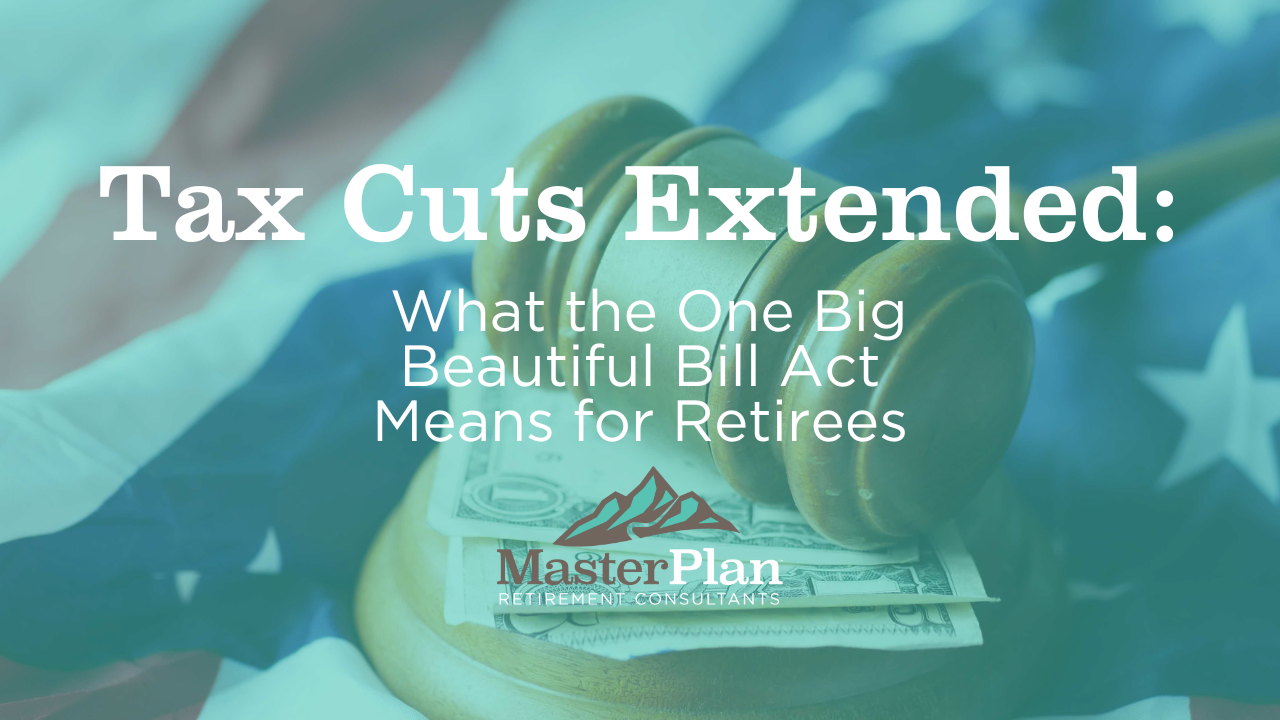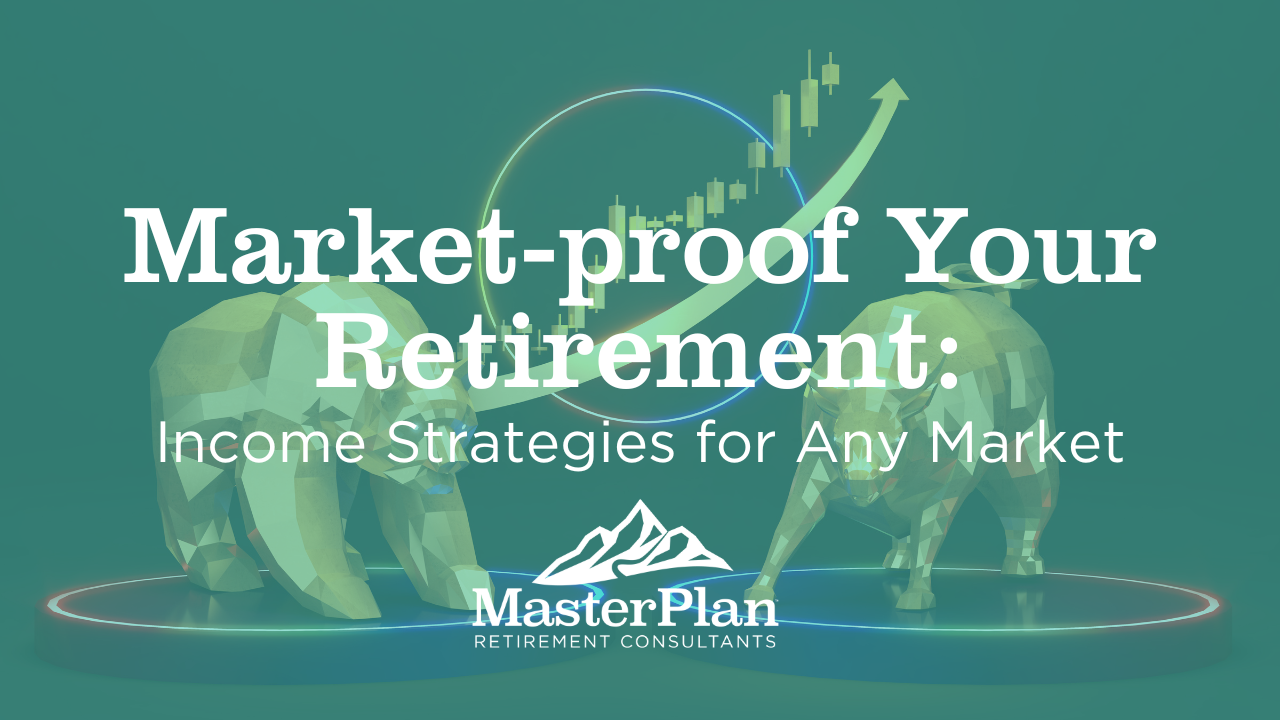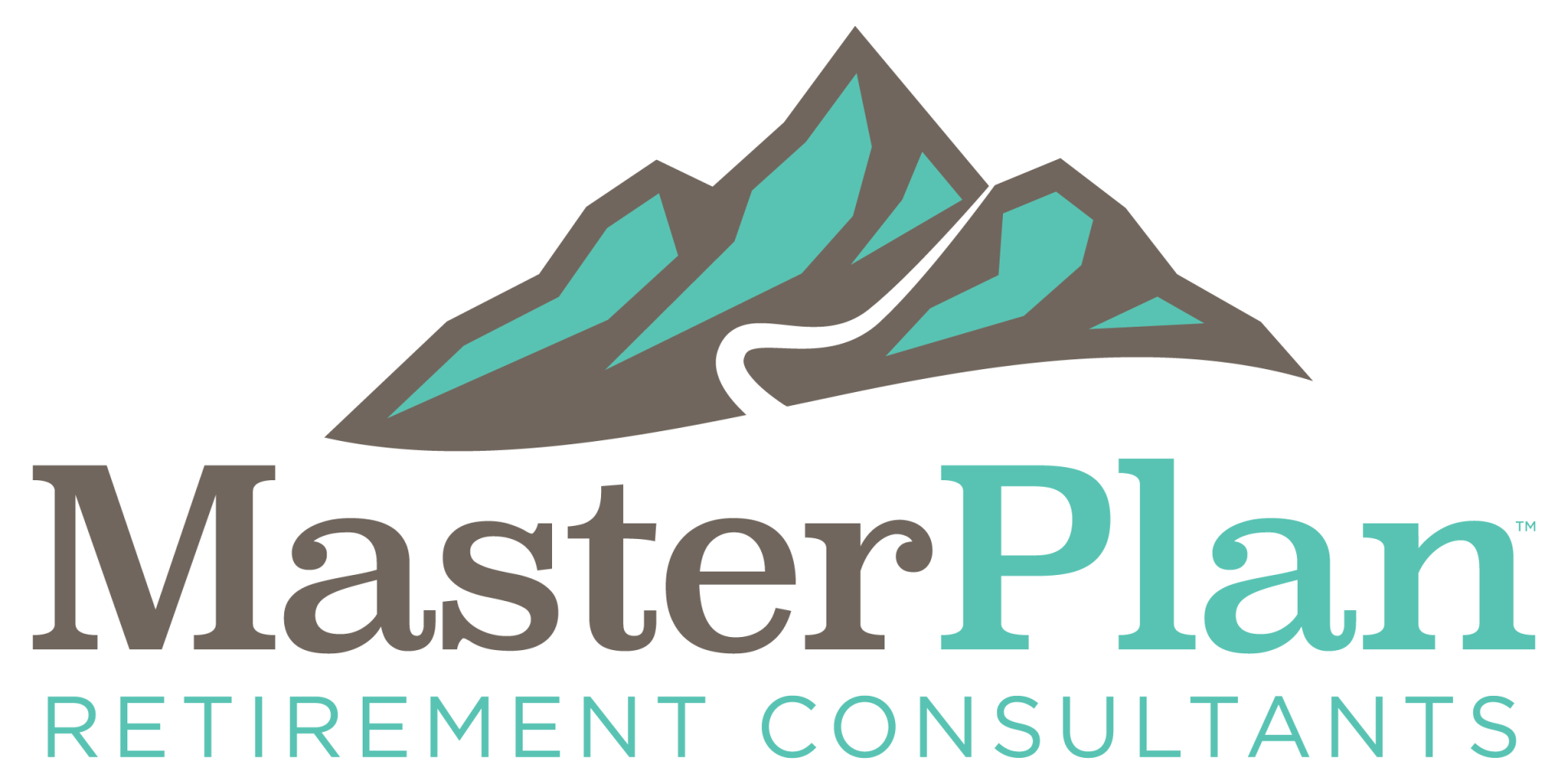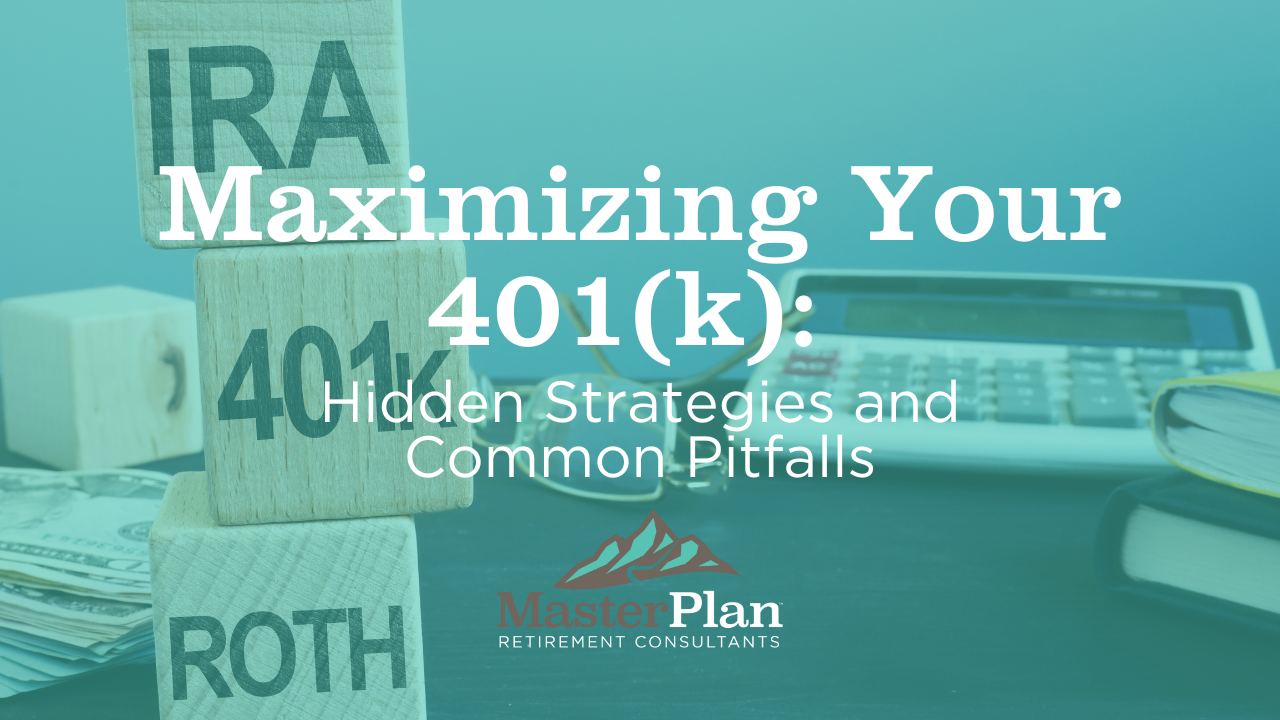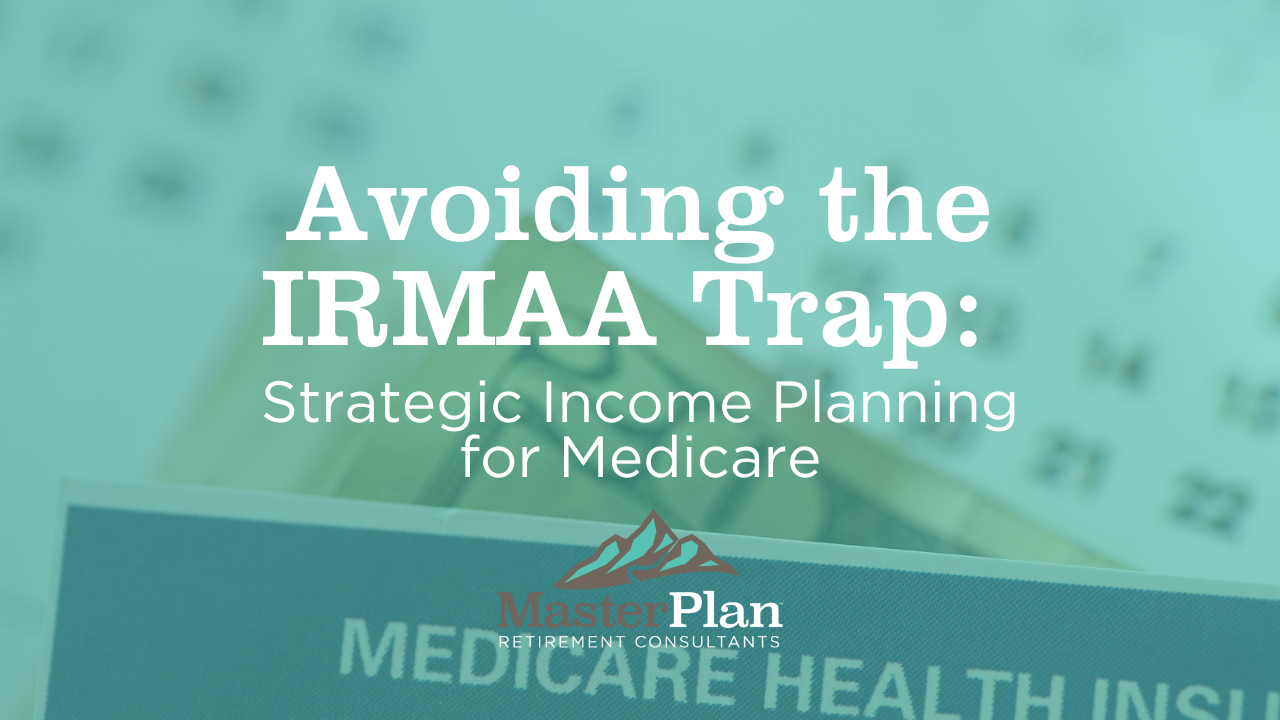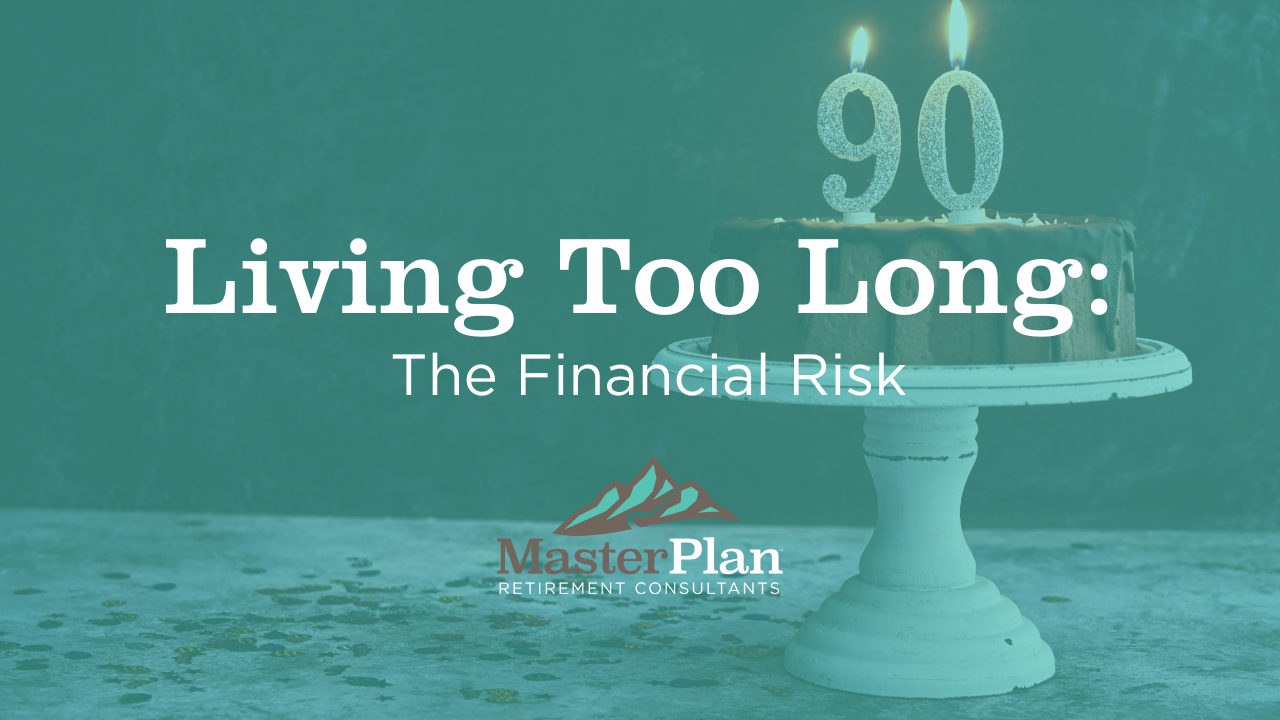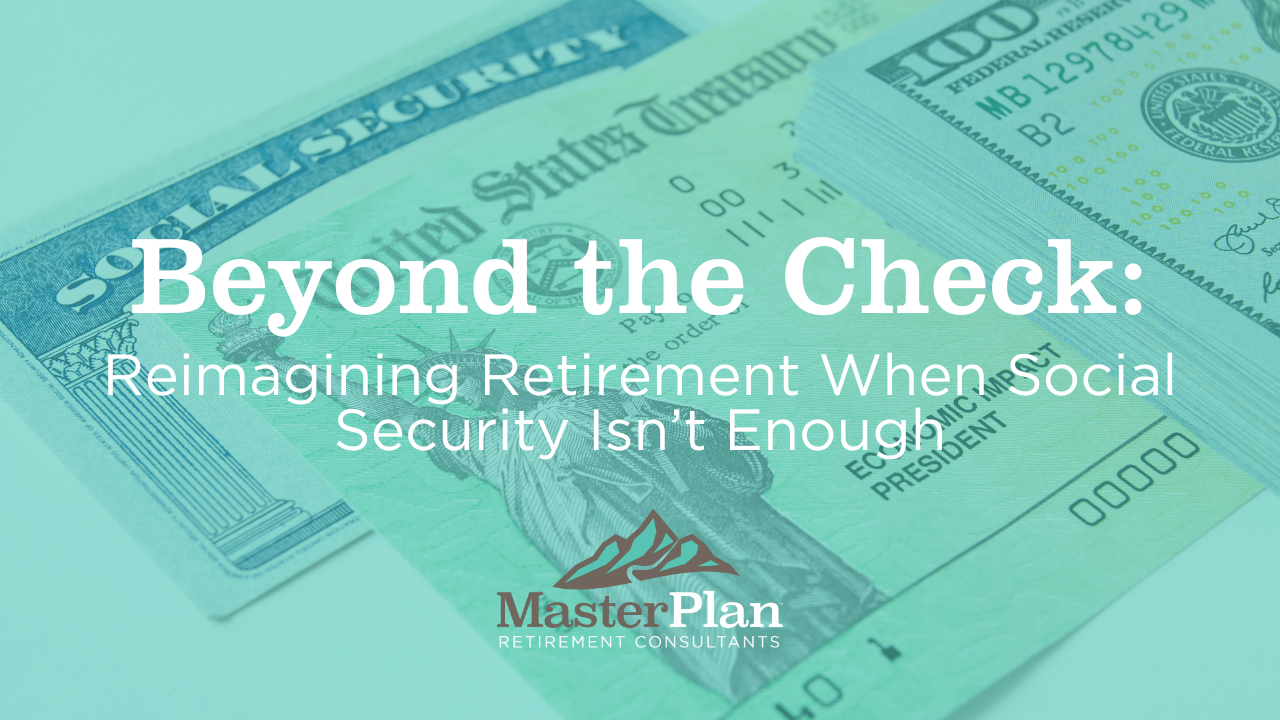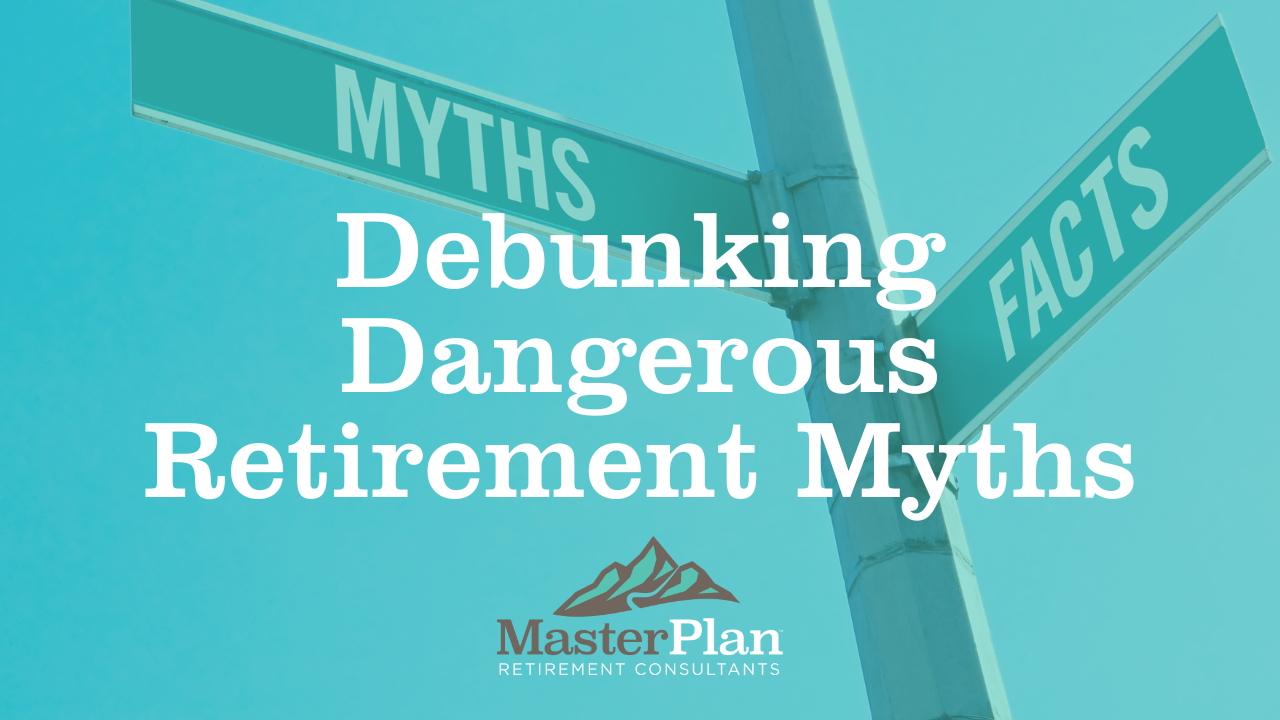When Career Plans Crumble: Strategic Options for Pre-Retirement Layoffs
On this episode of Retirement Roadmap, Evan and Mark dive deep into the strategies and considerations for those experiencing job loss within five years of retirement. Rather than making panic-driven decisions, we explore how to take stock of your situation, protect what you've built, and potentially discover that retirement is closer than you think.
Evan Fricks:
What if you're laid off right before retirement? Hey folks, thanks for joining us. Welcome back to Retirement Roadmap with MasterPlan Retirement Consultants. My name is Evan and with me, as always, retirement planner Mark Fricks. So what if you are laid off right before retirement? Consider a time when you're approaching retirement. Five years or less. Retirement is on the horizon, but your timeline has been abruptly cut short. With the tumult in the federal employee sphere, Mark and I have been working through these options with clients and prospects alike. We've seen a lot of this lately, Mark.
Mark Fricks:
A lot of emails, a lot of phone calls from our current clients that haven't retired yet from the federal government. A lot of their colleagues are asking hey, who do you work with, who do you talk to? Who knows the federal benefit world? Which is a totally different or another layer upon already what can be a complicated retirement. So a lot of contact. Of course we teach the federal classes, so we're getting more and more people coming to those. We're actually getting invited into departments of the government to teach. You know the department heads are inviting us in.
Hey, my people need to know what's going on, how it works in retirement. Should they pull the trigger or not pull the trigger, timing issues and also, as you know, just, we never know what the next email is going to say that comes from the government into the, you know, to the employees. There's always a change or, you know, maybe the courts have ruled something. So a lot of confusion for sure. But even in the corporate world, you know, there's always changes happening as well. So we're going to talk about that whole realm, I believe today?
Evan Fricks:
Yeah, absolutely. We're going to take a 10,000 foot view and then also get a little bit more specific on actual steps and things that you need to focus on. But the very first step you need to do is take stock, be organized. What do you have? Where are you? I'm hoping that within five years or so of retirement, you have started some pre-planning. You have maybe a timeline, some goals and objectives in place, but you definitely want to make sure that you're organized, have a solid financial statement in place, but number one priority is protect what you've built, so stabilize your finances. That comes down to cash flow. Make sure you have an emergency fund aim for six to twelve months of expenses, severance and unemployment. Maybe you could use these as a bridge. Look into those possible benefits. Spending; maybe you need to cut or pause non-essential spending. Travel, subscriptions, luxury expenses, these are all 10,000 foot view considerations for you if you were to have to navigate this sort of situation.
Mark Fricks:
Maybe you can start looking for something part-time. It may not be something you want to do forever, of course, but maybe just to bring in some extra money. While you're trying to decide do I retire, do I keep looking for another job, or what can I do? A lot of times when companies lay off, they will go back and hire folks part-time, kind of on a consulting basis, to save so many as well. So maybe check with some competition things of that nature, and I'm sure we're going to get into it. But also, you know, how do you handle your 401k or thrift savings plan as well.
Evan Fricks:
Another thing that we have been... It's already a huge deal in retirement, but it's becoming more and more forefront of people's minds because it's getting more and more expensive. That's health insurance. So if you're under 65 and this is a consideration for you you're not yet eligible for Medicare. Cobra can extend your employer's coverage for up to 18 to 36 months.
However, I did speak to the expenses of healthcare right now. Cobra is not cheap. The marketplace we often recommend people to check that out to bridge gaps. The marketplace we often recommend people to check that out to bridge gaps. Offer cheaper and that's absolutely that's. Another option is see what your spouse's plan has to offer and join that if possible. So if you've got a short time frame, you really want to have some smart planning and that goes down primarily. I mentioned this before reassess your retirement timing. Can you still retire on time? Mark and I meet with clients and prospects alike, always evaluating. This is what we're looking for, this is what we're shooting for. But can we retire earlier? Can we retire later? What does that look like? What changes may or may not need to take place?
Mark Fricks:
Yeah, a lot of that is just what we do from the very beginning, which is making money more efficient, and we've had so many people that have come to us and said I think I can retire in five years and because of all the levers we pull and all the strategies that we introduce and utilize, that they actually are able to retire sooner. So maybe your calculations are, ooh, I can't retire, but then we take a look at it and really do a deep dive into where you're at and where your spending is and things of that nature, and what can we get rid of. Maybe you can go ahead and pull that trigger. Hey, you know, I was waiting. I was going to wait two years or one year or three or whatever, but based on what these numbers are telling us and what we can do with those accounts, might be able to retire now. Might be a kind of a bad news. Oh now good news scenario.
Evan Fricks:
Right, and there are plenty of retirement reports you can run that are available online, but you really need to take the opportunity to speak to a financial professional, specifically a retirement planner, because they're going to have so many more considerations that this linear report on your IRA or Roth or whatever, is going to be able to offer you Some of those options. We're going to start to walk into now, some more specific considerations, but the first thing you need to do is rethink your retirement income sources, and that comes down one to being smart about withdrawals and timing of social security, you know two big things that can affect retirement a lot and of course that incorporates is all incorporated into an income plan, which is the first thing we put together for our clients as we start working together is where is it coming from?
Mark Fricks:
Maybe we need to go and turn on, if it's a couple, maybe one of those social securities, if they're eligible. I don't like to turn them both on early, but we look at the numbers and then we let the clients make the final decision. But that's certainly a source you can go to. Maybe you turn it on for six months and all of a sudden get another job. Well, you can actually turn it off or reset it, pay back what you got, Because if you're 62 or 63 and all of a sudden you get a job and you're like, wow, I'm making $50,000, $100,000, whatever it may be, you're going to be penalized on your Social Security. So you need to either stop it, adjust it, let them know, or reset it. You have one year to reset your Social Security. So, again, if you turn it on, you can actually pay it back and it goes back to being a larger check every year. You wait, and so that comes into play. And then the other thing you mentioned was income standpoint, was Social security timing?
Evan Fricks:
You don't want to be forced into taking it early if you have other options and you really need a financial professional to help look at what kind of options might be in front of you. And as far as options on withdrawals from retirement accounts like 401ks and IRAs, there are some specific things to consider for each of those account types. So if you're 59 and a half or older, you can access retirement accounts without penalties. Those 55 and up may also withdraw penalty free from the 401k tied to their most recent employer. That's a gotcha that a lot of financial advisors will ignore. If they just want to roll all of your money out of your 401k and you're under 59 and a half, you might lose that option to some liquid penalty free money.
Mark Fricks:
That right there tells me they either are not knowledgeable or they're not a fiduciary, or they're just trying to get your money in some account.
Yeah, so I'm going to take all that thrift savings plan money or all that 401k money or 403b money, roll it into iras with us so we can manage it, and then you're left with a penalty if you try to access those iras. So, very important, rule 55 and older at your current or latest job, you can actually access that money without a penalty. So we always like to leave a little bit in there. I say a little bit we, we, we do some calculations what you think you will need over the next one year, two years, whatever the time limit or timing may be. So very important to understand that. And again, why you want to get started earlier with working with someone that is knowledgeable, that is a fiduciary, because they will point out things like that. That can get you, can absolutely get you.
Evan Fricks:
There are other early access options that may be worthwhile to consider, like SEPP, which is substantially equal periodic payments, but those come with long-term commitments and limited flexibility. We might get into that option a little bit later. But have you also achieved your full retirement age, considering your employer benefits? Maybe you have a pension. If you are a federal employee, you do have a first pension and depending on how long you've worked will depend how much you're going to get paid for the rest of your life post-retirement. What benefits do you have being offered to you through your employer? Make sure that you look through all that as well.
Mark Fricks:
Yeah, and if you're being laid off a lot of times, there will be a package. Negotiate the package, don't just, especially if you're middle upper management, make sure you get with them and say, okay, you know this is a have to thing. I hate that this is happening. But you know, is it possible to pay my health insurance for the next year or six months? Do I get a severance package? How is that paid? Is it over time? Is it a lump sum? So many different things. What about my pension? Can I take it earlier? If there is a pension there, like you said, with the federal government, there are options to take it earlier, a lot of rules around that. So, just to sure you make good decisions, don't panic and again, we hold a lot of people's hands through this kind of stuff.
Evan Fricks:
Well, there are a lot of choices to make and a lot of times folks don't know what's better for them, even coming down to survivor benefits on a pension. Sometimes you need it, some people might not need it, and then they're paying for something for the rest of their life that they don't actually and something they may not ever use.
Mark Fricks:
If they pass away you know after the uh, the spouse then that money's wasted as far as that paying for that survivor benefit. So understand all the rules about that for sure another consideration would be to avoid irreversible income moves.
Evan Fricks:
So don't rush into tapping income sources that can't be paused or adjusted. Instead, consider using savings potentially home equity, but that will get a little bit more complicated to consider as well Downsizing as a more flexible bridge strategy. Annuities you know, once you annuitize an annuity, that's on forever, so make sure that that's where it needs to be before you turn it on and you're going to be getting the maximum amount that you were expecting from that. Annuity Pensions and also some pensions have the option to freeze as well.
Mark Fricks:
Freeze, or also maybe a lump sum option where they can roll the whole amount into an IRA.
Then you have the choices of how to take it, when to take it. Maybe create your own pension with a specially designed annuity that will pay out and can be stopped. Sometimes two. Many of the options they could stop. Start maybe at least once, or maybe just do withdrawals, as we may or may not get into later. The importance of having an income plan is where it's coming from, because you want a stable source, you don't want to be taking money out of a volatile stock market and you probably want to put the brakes on a lot of your investments. I don't mean go money market necessarily. I just mean go more conservative and, again, have a plan for where that money is coming from, whether it be short-term, long-term or whatever it may be. I come back to that word again efficiency, the efficiencies of your accounts. Reassess your social security, timing, the efficiencies of your accounts.
Evan Fricks:
Reassess your Social Security timing. You know claiming Social Security. Maybe you feel panicked or you might need that, you know what. Let's just turn it on now. I lost my job. Maybe we can retire early. However, you're going to cut your benefits by up to 35%, while in fact, delaying past full retirement age boosts them up to 8% annually until age 70. So, again, a layoff may force a change in plans, but talk with a financial services professional before making any permanent decisions.
Mark Fricks:
Yeah, and just to mention the website real quickly, because there are a lot of resources on our website. We have checklists for retirement things of that nature. So make sure you visit masterplanretire.com that again a lot of episodes on there as well. Also, there's a button on there that says schedule now or schedule an appointment, and basically what that does is opens up our calendar to give you a chance to have a phone chat, zoom call, a face-to-face meeting. If you're in the area, that we can help you start taking a look at where you're, at what's available to you, and then we can also run some reports as well to see if you are ready for retirement. It'll be a higher foot view, as we like to say a 30,000-foot view, but then we can take a look and say, okay, we think that this might work a little bit better. We've got to watch out for this or whatever, and that's all complimentary, and so we'd be glad to do that for you. You can also reach us at 770-980-9262. I hope you take advantage of that.
Evan Fricks:
I did mention the SEPP earlier substantially equal periodic payments that allow for penalty-free withdrawals from IRAs at any age. However, they're inflexible and once you turn them on you're locked in. So, basically, do you know the formula off the top of your head on how much you have to take out? Annually?
Mark Fricks:
It depends on your age, but it seems to be between four and 6%.
It's like an early RMD almost.
Yeah, it's called 72T. It's something else it's called because that's where it's found in the IRS code. But it is a way of getting out four to 6% from an IRA with no penalties, but you have to do it for at least five years and even if you pass age 59 and a half, you still have to keep doing it, whichever is longer, for at least five.
Exactly, at least five years or until you're 59 and a half. So if you started at 50, you've got to do it until 59 and a half, type of thing. So be careful. Again, a lot of advisors don't even know about this. I've got a lot of CPAs that don't know about this opportunity. So another way of working with someone that understands. I mean, we've been in this business a long time, we've seen a lot of different scenarios and so we have a depth of knowledge and if we don't know it, we know where to get that information for you.
Evan Fricks:
A pretty substantial client base at this point and we only have a handful of people that are doing 72Ts.
It's a very specific to your plan strategic scenario. So again, this is something that you don't want to just jump in with a unless you've consulted a financial advisor, retirement planner, specifically for your plan.
Mark Fricks: Just a little caveat on that. It is also a way of getting some of your IRA money into.
Roths.
You , can Can 72T out, put into a Roth or a specially designed tax-free account and that's a way of doing conversions in addition to a regular Roth conversion. That's right.
Evan Fricks:
So the overall theme to this section is stay strategic, not reactive. This stage of life is about planning, not panic. Think long term and avoiding boxing yourself into a financial corner. You've worked hard. Now it's time to protect what you've built. Another option for consideration: a bridge job. You could stay in the workforce strategically. This could preserve savings, extend your benefits, redefine what work is in retirement for you. So early retirement isn't necessarily your only path. Explore part-time, fractional, passion-based work that brings fulfillment and purpose without the full-time grind.
Mark Fricks:
And maybe health. Insurance.
Evan Fricks:
And maybe even some benefits.
Mark Fricks:
Depending on how many hours you work. There's some companies out there that will give you health insurance with 20, 25, 30 hours of work week, so that's a huge benefit.
Evan Fricks:
It's incredible how much, even on reports, a little bit of part-time income can extend a retirement on an income plan.
Mark Fricks:
Yeah, it may not be that you can save a lot of that money, but you're covering your expenses and letting your other money grow for that much more time, and so again. So if you're in that position, maybe we get. We position your money in a different way than because you're not pulling money from it. So every plan is different, Every scenario is different. It's just something we have to work numbers and walk through and talk through.
Evan Fricks:
That's right, that's right. So the last section to consider is your mindset and your emotional stability. Accept the shift. If you're being laid off and you're close to retirement and you know what, this is not part of my plan or my time horizon that I have been working towards. Accept the shift and don't panic. This is a transition, not a failure.
Mark Fricks:
Well, anybody that's been on this earth a little while knows that life is not going to go the way we want it to go. That's life.
And you have, yes, so you have to roll with the punches. I'm not trying to belittle this, I'm just saying that it does. You know, if I've got, if I have a curve ball thrown at me, I go looking, you know, for help. You know if it's a personal crisis, I might go to you know, my pastor or something. If it's a tax situation, I go to my seat. So you go seek help mentally, emotionally, financially, whatever that it calls for. I've had people go to counseling when they get laid off and stuff to kind of work through their feelings and things like that. So don't be afraid to do that. I know, as a guy, sometimes I'm like I don't need help, but you know, maybe you do.
Evan Fricks:
Many people work in different ways after a quote, unquote retirement age. Just remember, you still have options. Take care of your mental and emotional health first. Stress at this stage can also affect your decision making Panic decisions. You know, one of the biggest factors to people losing money when managing their own money is because they have emotional responses. Fear and greed One of those two. Those are the biggest contributing factors. So the first thing that you could do is tap into your professional network. Reach out to former colleagues, managers and work acquaintances. A simple phone call, coffee chat or message can lead to unexpected job opportunities.
Mark Fricks:
That's where most jobs come from. That's right. So many people have gotten jobs from getting on. It could be LinkedIn with friends and colleagues, or they've just kept in touch with folks over the years. Don't burn bridges, right. That's one of the reasons you don't burn bridges. But they may not have a job where they're at, but they may have heard of hey, so-and-so is doing this or that or the other. So certainly get on Facebook with friends and let them know that hey, this is what's going on. Seek that out. I'm sure these job boards work. I've just never known too many people personally that have gotten a job on a job board, but I know they work. But still, those relationships are much more powerful.
Evan Fricks:
It seems like the more powerful jobs, the more lasting jobs come through relationships, but of course that's. You know that's not every case, but in the sake of posting online, you know you would want to take the opportunity to polish your digital presence a little bit, update your LinkedIn profile or create one if you haven't done so yet. A professional online presence acts as your modern day resume and it opens doors beyond your immediate circle, so that could be helpful.
Mark Fricks:
And depending on what level of job you have or that you're seeking. I mean, many folks now are hiring people, of course, to punch up that resume. I wouldn't know what to do when it comes to social media If I had to look for a job there's so much out there and so many ways to present yourself I'd probably have to hire somebody to come in and Ever since Microsoft got rid of Clippy.
Evan Fricks:
Now I have no idea how to update my resume.
Mark Fricks:
I have no idea what that is.
Evan Fricks:
You don't even know who Clippy is. That's a cartoon character.
Mark Fricks:
That is, it is actually.
Evan Fricks:
Another consideration is to start before you're forced to. If you're even slightly unsure about your job security, begin networking now and also everything we've discussed before. Start organizing and taking stock of where you are. Don't wait for a layoff to start making career connections or exploring your options. That's a great point.
Mark Fricks:
I've heard of many of our clients that, hey, this is rumbling in our company, we just got bought or whatever, and they go and start putting feelers out and finding the next opportunity. Or again, can I retire, yeah, so come back to that question again.
Evan Fricks:
And Mark mentioned a little bit of this earlier. Lean on your personal circle. Friends can offer emotional support, shared experiences and helpful advice. Their encouragement might be the confidence boost you need to move forward, or even move forward boldly. And I would also say, use the time to pause and reflect. You know, if you have a financial cushion, consider taking a short breather. Use this unexpected break to reflect on your purpose, explore passions and realign your next career or life step with what matters the most to you.
Mark Fricks:
Yeah, it sounds difficult to do that because you're like I know when I've been. You know when I was much younger and was between jobs or whatever. It's a little bit of a panic initially, but really just grab hold of that and then just say, okay, you know, let's do a reset. Let's think about was I even happy doing what I was doing? Maybe I can afford to pick up some online classes or whatever, brush up some skills, add some skills or whatever. So it is a good time to kind of reset, refocus and again, you know those people around you, whether they be professionals or friends or whatever, can really give you that help. You know the help that you need to. Let's think about this.
Evan Fricks:
And if the concept of pausing for a minute in a quote-unquote crisis where you're about to lose your job, if the idea of pausing for a minute seems completely foreign or impossible and maybe you say I don't have that kind of savings ready, I don't have that kind of nest egg where I can afford to not hit the ground running immediately, then that's also a great opportunity. Maybe you should speak to a financial professional, discuss budgeting, discuss how to save and move forward for your own retirement. We mentioned so many different things, from employer benefits and options that you can do with your withdrawals, timing of all of these things and how they all work together. It's critical that you understand how each area works with other areas, Because when you make a change in one area, it's inevitably going to affect other areas. You need to speak with a retirement planner, especially if you're close or within five or 10 years to retirement. Beautiful time to sit down, get organized. What are my goals? What are my dreams? Dreams? What am I afraid of? How do I get to where I?
Mark Fricks:
need to go. Yeah, I think half our job, evan, as you know, is almost counseling. It really is calming folks down, letting them talk, letting you know, hearing what they've got to say and then giving them the assurances. Well, let's take a look at this. We really think that that we can get the situation, get our heads heads wrapped around it and really maybe find a way to get you retired or at least getting closer to that point. Again, our experience has shown that on their own, folks are not able to be as efficient. You can Google all you want and it will give you lots of information, some of it bad, some of it good, some of it does not. Most of it does not apply to you. What is your situation and how can we further improve what you've got to make it more efficient? I've used that word several times in this episode, but we need to squeeze as much lemon out of that lemon as we can, and I think there's more in that lemon than you think there is than you think there is.
Evan Fricks:
I think more folks more often than not folks when they come to us to look at their own retirement options, they can, for the most part, don't realize that they actually have the ability to retire. You just have to walk through the process and have your case analyzed, and if you're not able to, then we'll show you the steps to get to where you need to be.
Mark Fricks:
Yeah, I hope you'll plan to come see us take advantage of the complimentary consultation. Thank you for joining us today. Remember, until we see each other again, plan well and prosper, take care.
This was Retirement Roadmap Radio with Mark Fricks of MasterPlan Retirement Consultants. To schedule a complimentary consultation, go to masterplanretire.com or call 770-980-9262.
All matters discussed during this show are for informational purposes only. Each individual situation may vary and the opinions expressed here may not apply to everyone. Materials presented are believed to be from reliable sources and no representations can be made as to its accuracy. All ideas and information should be discussed in detail with one of our qualified representatives prior to implementation. Advisory services offered by MasterPlan Retirement Consultants a Registered Investment Advisor in the state of Georgia, Mark Fricks and MasterPlan Retirement Consultants are not affiliated with or endorsed by the Social Security Administration or any other government agency.
